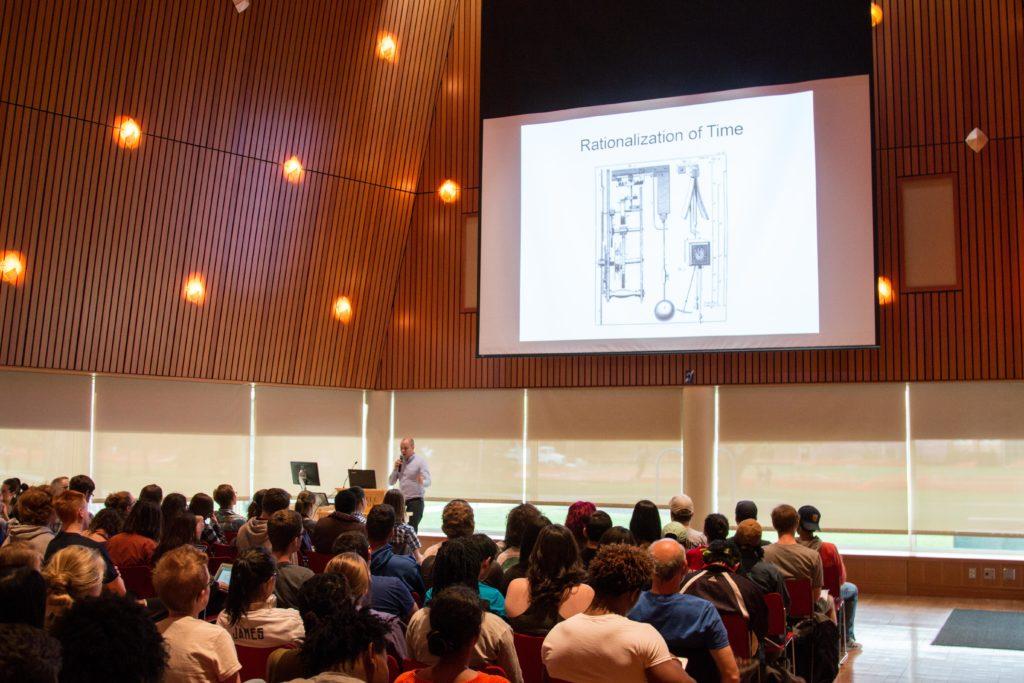
Peter Frase, an editor at Jacobin Magazine, came to Grinnell on April 24 to give a talk called “Four Futures: Life After Capitalism,” derived from his recent book of the same name. Multiple departments and faculty members, including Professor Patrick Inglis, sociology, sponsored the talk.
Frase prefaced the main segment of his speech with the driving question: “Who owns the robots?”
His presentation discussed the rise of artificial intelligence and its dangers to society. The anxiety is ever-present now with popular headlines such as: “Bill Gates says robots that steal jobs should pay taxes.”
This fear of losing jobs to technology relates to some aspects of the 2016 presidential election, in which Bernie Sanders and Donald Trump both supported withdrawing from the Trans-Pacific Partnership in fear that outsourcing would cause American wages to decline.
Frase, however, said that “this question goes back to capitalism itself.” He does not trace what he calls “automation anxiety,” the fear that robots will steal jobs, to the Industrial Revolution, but rather to the invention of “rationalized time” and automated clocks in the seventeenth century, which first allowed employers to measure worker productivity.
Although technology can both benefit and harm workers, Frase focused on the disadvantages of technology in the workplace. He made it clear that Luddism, which most think of as “abstract rejection of technology,” is actually a targeted response to the looming anxiety that workers will be out of jobs due to technological advancements.
Technology is helpful in that it can help increase productivity for workers, and if wages increase with productivity, then workers can benefit. In reality, wages and productivity haven’t positively correlated since the 1970s.
Frase talked about the folklore story of John Henry, the “Steel Driving Man,” and how it exemplifies the conflict between the worker and technology. John Henry uses a steel drill on rocks to make way for explosives. He wins in a competition against a steam-powered hammer, but dies of a heart attack. This story conveys the ultimate weakness of workers.
Frase then mentioned other stories and examples from popular culture such as the movie “Metropolis” and Michael Moore’s “Downsize This.”
These anecdotes culminated with Frase’s belief that the number of jobs will continue to decline due to technology.
Moreover, Frase pushed this idea that there is no solution to the ecological crisis. Although current developments in technology help mitigate human damage to earth, they are only temporary solutions. He talked about “Frankenstein,” which he believes is really about the scientific abandonment of monsters. Frase believes that if Frankenstein’s creator did not abandon him, then Frankenstein could have become human. Drawing a parallel to this story, he said that “this system we have made, including the carbon cycle and the nitrogen cycle and so many other things is a Frankenstein monster.”
Frase believes that complications of capitalism — the ecological crisis, population growth and more — will ultimately contribute to four potential futures, which are socialism, communism, extremism and rentism. Frase believes that socialism will occur without hierarchy, but with scarcity of resources and everything will be distributed equally. Conversely, extremism occurs with hierarchy and scarcity — a system analogous to the one we have today, in which the wealthy dominate and the poor suffer. Communism, however, will occur without hierarchy, but with an abundance of resources.
“[I drew] on social and natural science as a way to motivate a series of ideal types, simplified futures that illuminate the interaction between different factors.”





















































